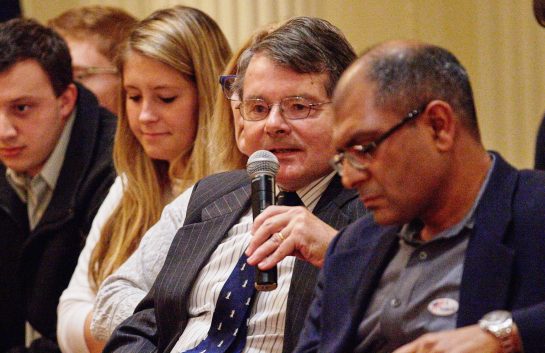Hare Pens Op-Ed on How US, China and Arab Diplomacy Has Enabled Iran Over Palestine

In an opinion piece published in the Jerusalem Post on June 9, 2024, former UK diplomat Paul Hare, Master Lecturer in International Relations at the Frederick S. Pardee School of Global Studies and Interim Director of the Center for Latin American Studies (CLAS) argues that recent diplomacy by the United States, China and Arab Gulf states has inadvertently benefited Iran and allowed it to wrest the Palestinian cause away from Arab states.
Hare contends that the Abraham Accords between Israel, the UAE and Bahrain in 2020, brokered by the Trump administration, were motivated more by side deals like US arms sales than resolving the Israeli-Palestinian conflict. This created an opening for Iran to position itself as the true defender of the Palestinians.
Similarly, Hare believes China’s mediation of the Iran-Saudi rapprochement in 2023 was driven by its desire to have both countries join the BRICS group and Belt and Road Initiative, rather than uniting the Gulf states and Iran on the Palestine issue. However, Iran’s social media prowess enabled it to portray Arab states as betraying the Palestinians.
Hare notes some course corrections, with the UAE and Bahrain refusing to move embassies to Jerusalem, Saudi Arabia hesitating on joining BRICS, and Arab states sharing intelligence with Israel ahead of Iranian missile strikes. However, he argues the US and China have learned hard lessons about the unintended consequences of Middle East diplomacy not genuinely motivated by peace.
The former British diplomat concludes that neglecting the Israeli-Palestinian conflict for the sake of other interests has backfired by empowering Iran. He expresses hope that the recent devastating Hamas-Israel conflict will spur the international community to re-engage on the Palestine issue in a more thoughtful and productive manner going forward.
The article can be accessed here.
Ambassador Paul Hare was a British diplomat for 30 years and the British ambassador to Cuba from 2001-04. He now teaches classes at Boston University on Diplomatic Practice, Arms Control, Intercultural Communication, and on Cuba in Transition. His novel, “Moncada — A Cuban Story,” set in modern Cuba, was published in 2010. His book, “Making Diplomacy Work; Intelligent Innovation for the Modern World” was published in 2015. Learn more about him here.